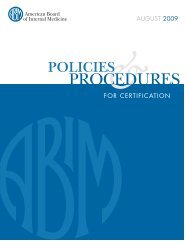The SRA Symposium - College of Medicine
The SRA Symposium - College of Medicine
The SRA Symposium - College of Medicine
Create successful ePaper yourself
Turn your PDF publications into a flip-book with our unique Google optimized e-Paper software.
<strong>The</strong> Unconscious Expression <strong>of</strong> Ego Defenses:<br />
Increasing Self-Knowledge for the Research Administrator<br />
Elizabeth Holmes Ph.D., ABPP<br />
700 St. George Barber Rd.<br />
Davidsonville, MD 21035<br />
Author’s Note<br />
<strong>The</strong> author gratefully acknowledges dialogue with two <strong>SRA</strong> Northeast Section members concerning<br />
the content and development <strong>of</strong> this paper: Associate Dean Sharon McCarl and Dr. Edward<br />
Gabriele. For questions and further dialogue concerning the context <strong>of</strong> this paper, the author can<br />
be reached as above.<br />
Abstract<br />
As a psychologist reflecting on numerous conversations and consultation with individual <strong>SRA</strong><br />
members, a pattern <strong>of</strong> common questions about human behavior comes to mind. This paper attempts<br />
to assist research administrators to understand and have compassion for themselves and<br />
others when under stressful conditions. When under extreme stress, a person’s psychological<br />
balance will shift and less mature defenses emerge. Defense mechanisms are mostly unconscious,<br />
start early in life, protect the ego against pressure, and gratify the ego with reduced anxiety. We are<br />
all vulnerable to the unconscious use <strong>of</strong> defensive maneuvers. Becoming consciously aware <strong>of</strong> our<br />
preferred unconscious defensive tactics is the first and most important step towards improving the<br />
way we cope with anxiety under stressful conditions. This self-knowledge is critical for the pr<strong>of</strong>essional<br />
development research administrators bring to the contributions they make to the research<br />
programs, institutions and investigators whom they lead and serve.<br />
Introduction<br />
As a psychologist reflecting on numerous conversations and consultation with individual <strong>SRA</strong><br />
members a pattern <strong>of</strong> common questions about human behavior comes to mind. Why are people<br />
so defensive when they receive stressful (bad) news? Is being defensive normal? How much defensiveness<br />
is healthy? What are the defense mechanisms? Is one ego defense better than another?<br />
This paper will attempt to address these five questions with the intention <strong>of</strong> helping <strong>SRA</strong> members<br />
to understand and have compassion for themselves and others when under stressful conditions.<br />
Question 1<br />
Papers<br />
<strong>The</strong> first question – Research administrators who feel caught in the middle <strong>of</strong> multiple dilemmas<br />
<strong>of</strong>ten ask the question, “What is stress?” <strong>The</strong>y tell me about the competing demands <strong>of</strong> feeling responsible<br />
to and for the institutions they work in, the investigators they review research proposals<br />
for, and the research subjects, both human and animal, involved in those studies.<br />
<strong>The</strong> term stress is derived from the Latin word “strictus” (Auerbach and Gramling 1998). In the<br />
past the term stress has been used to encompass both a stimulus event and a response to that event<br />
(Keefe, 1988). Today, stress can be conceived <strong>of</strong> as the changes within people as they are in a situation<br />
that they determine to interfere with their well-being. <strong>The</strong>se changes include physical, psychological,<br />
and behavioral components. <strong>The</strong> circumstances, which provoke a stress response, are<br />
termed “stressors.” Coping responses vary from person-to-person and from situation-to-situation.<br />
Coping skills or abilities are our attempts to adjust to or manage the physiological and emotional<br />
aspects <strong>of</strong> our perceived stress.<br />
2005 <strong>Symposium</strong> Proceedings Book 123

















